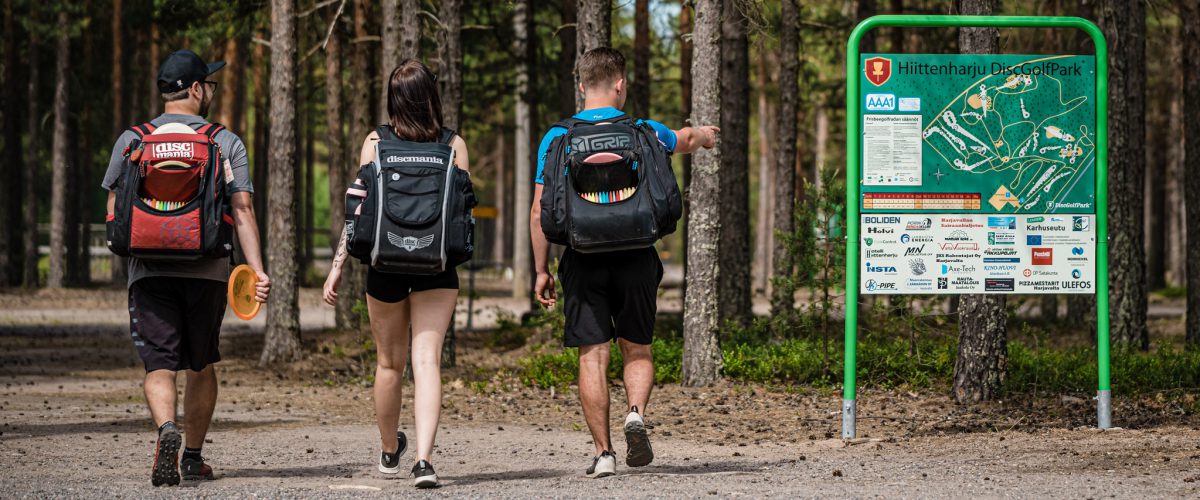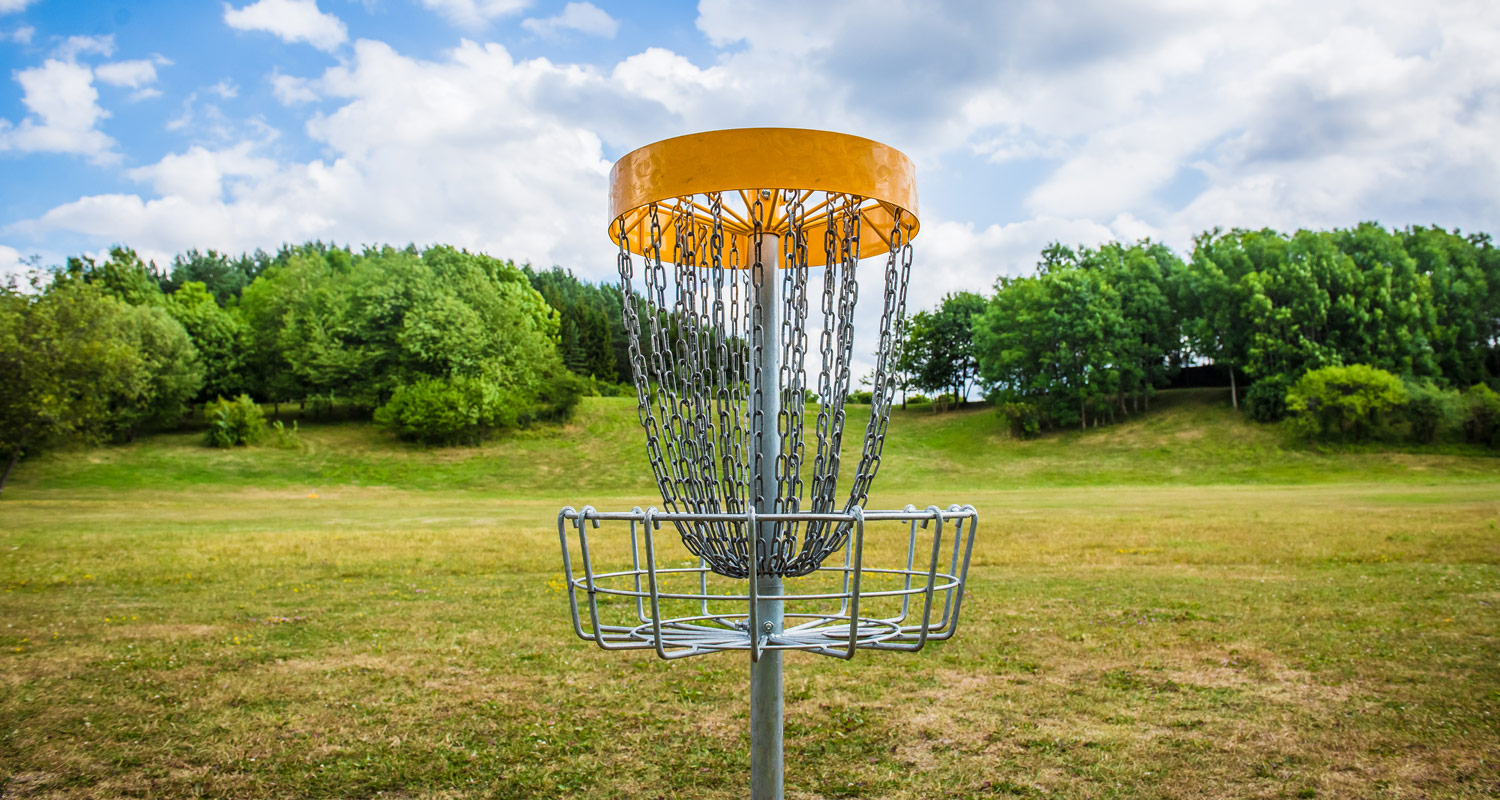To build a Frisbee golf course, start with strategic planning of hole layouts and securing suitable land. Ensure the design offers diverse challenges and adheres to safety standards.
Creating a Frisbee golf course, often known as disc golf, is becoming an increasingly popular endeavor for communities, parks, and even backyards. It requires a thoughtful design that incorporates the natural landscape while providing a mix of technical challenges for players of all skill levels.
A successful course layout balances distance and accuracy, with holes designed to offer a variety of shot options. Grounds maintenance, safety, and environmental impact are also pivotal considerations. Whether you’re looking to install a professional-grade course or a modest home setup, the fundamental principles remain consistent: a keen eye for detail and a commitment to creating an engaging, playable experience.

Credit: www.discgolfpark.com
The First Tee: Beginning Your Frisbee Golf Course Journey
Frisbee Golf, also known as Disc Golf, is a fun and inclusive sport. It combines the flight of a frisbee with the rules of golf. Building a course is an exciting adventure. Let’s begin by establishing the first tee.
Choosing The Right Location
Selecting the perfect spot is crucial for your frisbee golf course. Consider these factors:
- Accessibility – Easy for players to reach.
- Visibility – Attracts newcomers to the sport.
- Safety – Away from busy areas to prevent accidents.
Scout several locations. The ideal spot will have a mix of open fields and wooded areas. This variety challenges players and keeps the game interesting.
Understanding Land Requirements And Zoning
Your chosen location must meet specific land and zoning requirements. Check the following:
| Requirement | Details |
|---|---|
| Size | Average course requires 1-2 acres per hole. |
| Zoning laws | Must comply with local regulations for land use. |
Reach out to local authorities early. Ensure your plan fits within community guidelines. Avoid delays in the approval process.
Course Layout And Design Principles
Designing a Frisbee golf course requires careful planning, creativity, and appreciation for the landscape. A well-designed course not only challenges players but also integrates seamlessly with its environment. Following specific layout and design principles ensures a balance between playability and natural beauty.
H3: Mapping the Terrain: Making the Most of TopographyMapping The Terrain: Making The Most Of Topography
Understanding the land is the first step in designing a Frisbee golf course. Accurate terrain maps lead to strategic hole placement and diverse challenges.
- Identify natural features such as hills, valleys, and water bodies.
- Evaluate soil condition to prevent erosion and maintain sustainability.
- Use elevations to your advantage, creating “risk vs reward” shots.
Visually appealing views enhance the player’s experience and promote return visits.
H3: Designing a Balanced Range of HolesDesigning A Balanced Range Of Holes
A range of holes caters to players of all skill levels and keeps the game intriguing.
- Include a variety of distances, from short putts to long drives.
- Balance the hole types with an equal mix requiring left, right, and straight throws.
- Consider the use of obstacles like trees, bushes, and terrain changes.
| Hole Type | Number | Challenge |
|---|---|---|
| Short | 4 | Precision |
| Medium | 8 | Strategy |
| Long | 4 | Power |
Incorporate signature holes to make the course stand out and become memorable to players.
Nuts And Bolts: Preparing The Land
Before embarking on the exciting journey of setting up a Frisbee golf course, it’s crucial to address the groundwork. Preparing the land is the first step in transforming a raw space into a disc golfer’s haven.
Tree Management and Waste ClearanceTree Management And Waste Clearance
Tree management is key to a balanced course. It maintains natural beauty and challenges. Consider these steps:
- Assess tree health and safety
- Trim or remove hazardous branches
- Enhance visibility and pathways
Waste clearance ensures a clean, safe environment for players:
- Remove trash and debris
- Install waste bins along the course
- Maintain regular cleanup routines
Installing Baskets And Creating Concrete Bases
Next, focus on installing baskets and creating concrete bases. They are vital for a professional and enduring course. Steps include:
| Step | Action |
|---|---|
| 1 | Measure and mark correct placement for baskets |
| 2 | Dig holes for the concrete bases |
| 3 | Mix and pour concrete into holes |
| 4 | Set baskets into the concrete |
| 5 | Allow concrete to cure before using baskets |
With these essential steps completed, your course starts to take shape, welcoming players to its fairways.

Credit: chascrazycreations.com
Teeing Up: Constructing Launch Pads
Creating a Frisbee golf course starts with the essential launch pads, known as tees. These starting points set the pace for the game. Well-crafted tees enhance safety and accessibility, and can be built with various materials to fit any landscape. Let’s explore how to construct these vital components of your Frisbee golf course.
Materials For Tee Areas
Different materials serve different needs and environments:
- Natural grass: Blends with the environment, but requires regular maintenance.
- Gravel: Offers good drainage, but can shift over time.
- Concrete: Durable and low maintenance, the most popular choice for permanent tees.
- Rubber mats: Provide good traction and are movable.
| Material | Pros | Cons |
|---|---|---|
| Grass | Eco-friendly, natural look | Requires mowing, can get muddy |
| Gravel | Good drainage, inexpensive | May need leveling, less stable |
| Concrete | Long-lasting, low maintenance | Permanent, higher upfront cost |
| Rubber | Portable, good traction | May degrade in sunlight, slippery when wet |
Ensuring Safe And Accessible Teeing Points
Safety and accessibility are key when building tee areas. Follow these steps:
- Choose flat ground to prevent trips and falls.
- Avoid locations near water or steep slopes for safety.
- Provide clear signage with hole info and directions.
- Include ample space for a run-up and follow-through.
- Make tees accessible for all players, including those with disabilities.
On-course Amenities And Maintenance
A Frisbee golf (Disc Golf) course isn’t just about the fairways and baskets. Players need comfort and certain amenities to enjoy the game fully. Moreover, regular maintenance ensures a course looks great and plays well. Let’s dive into the essentials of on-course amenities and maintenance strategies.
Facilitating Player Comfort With Facilities
Creating a welcoming environment involves installing amenities that offer convenience and relaxation. Bathroom facilities should be accessible throughout the course. Benches or shaded areas allow players to rest and regroup. Signs and maps help in navigation and keeping track of scores.
- Comfort stations with water and rest areas
- Clear signage for easy course navigation
- Seating arrangements such as benches at tee pads
- Trash and recycling bins to keep the course clean
Upkeep Strategies For A Pristine Course
A course’s beauty lies in its maintenance. Grass trimmed to consistent heights is essential. Check baskets and tee pads for damage regularly. Schedule clean-up days to manage waste and fallen branches.
| Maintenance Task | Frequency |
|---|---|
| Mowing grass | Weekly |
| Emptying bins | Bi-weekly |
| Checking equipment | Monthly |
| Clean-up days | Quarterly |
Training staff or volunteers on maintenance practices keeps the course in top shape. Secure investment in quality tools and machinery. Keeping a log of repair works and upkeep schedules is beneficial for long-term care.
Driving Revenue: Ways To Profit From Your Course
Launching a frisbee golf course entices athletes and outdoor enthusiasts alike. Not only does it broaden sporting horizons, but it also opens up diverse revenue streams. With astute management, your course can turn into a profitable venture.
Management Of Fees: Parking Passes And Rentals
Introducing a structured fee system is critical. Consider offering seasonal passes for regular visitors. This encourages repeat play and ensures a steady income flow. Parking fees can add to the revenue without overburdening players. Equipment rentals, including premium discs and carts, can also boost your earnings. Ensure these services are prominently advertised at the course entrance and on your website.
Leveraging Pro-shop Sales And Events
A well-stocked pro-shop can become the heart of your course’s financial success. Offer a wide range of products, from beginner discs to professional-grade equipment. Enthusiasts are always on the lookout for the latest gear. Don’t forget apparel and accessories, which can be great for those who forgot to bring something or want a souvenir. Coordinate clinics, tournaments, and leagues to keep players engaged. Each event stands as an opportunity to drive sales and registration fees.

Credit: www.innovadiscs.com
Frequently Asked Questions On How To Build A Frisbee Golf Course
How Many Acres Do You Need For Disc Golf Course?
A standard 18-hole disc golf course typically requires 1 to 2 acres per hole, totaling 18 to 36 acres.
How Do I Build A Disc Golf Course?
Secure proper land and permission for use. Design varied holes with different lengths and challenges. Install baskets and tee pads, ensuring environmental care. Offer clear signage for navigation. Maintain the course regularly to provide a quality experience.
Can A Disc Golf Course Be Profitable?
Yes, a disc golf course can be profitable through parking passes, equipment rentals, pro-shop sales, and hosting events.
How Many Holes Does A Frisbee Golf Course Have?
A standard Frisbee golf course typically has 18 holes.
Conclusion
Creating your own frisbee golf course can be a rewarding endeavor. With careful planning, you can design a course that’s both challenging and fun for players of all levels. Just remember to respect the natural landscape, understand the needs of your target audience, and comply with local regulations.
Whether it’s for personal enjoyment or community engagement, a well-built frisbee golf course can provide endless entertainment. Now, grab your discs and let’s play!